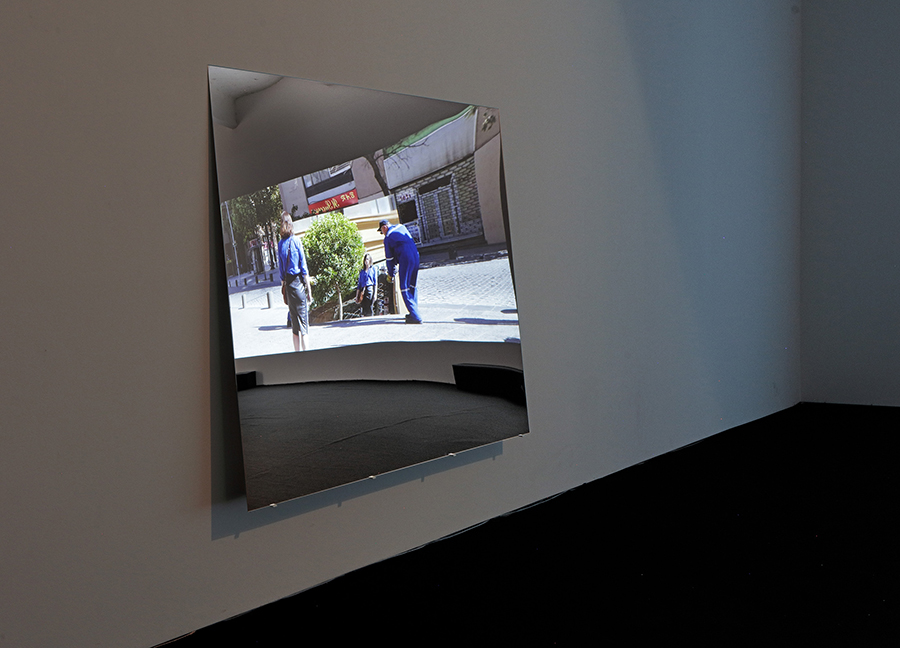Puppies Puppies Mirror the Boundaries of Cinema and Art
An exhibition at Galerie Barbara Weiss, Berlin, transports Sebastián Lelio’s award-winning film Una mujer fantástica into the gallery space
An exhibition at Galerie Barbara Weiss, Berlin, transports Sebastián Lelio’s award-winning film Una mujer fantástica into the gallery space

Puppies Puppies’s ‘Una mujer fantástica (A Fantastic Woman)’ at Galerie Barbara Weiss in Berlin is centred around Sebastián Lelio’s titular, feature-length film, which is screened repeatedly throughout the run of the show. For a previous exhibition, ‘Still Alice’ (2016), at Outpost in Norwich, the artist showed Richard Glatzer and Wash Westmoreland’s eponymous indie drama at regular intervals during opening hours, drawing attention to the demise of local arthouse cinema in a provincial city by over-extending the film’s limited-run screening. Here, Una mujer fantástica (2017) is projected on a gallery wall as a video installation alongside several sculptural elements that relate to the film.

By screening the work outside of official channels of circulation, what becomes apparent is not so much issues of legal copyright but of redistribution. In Puppies Puppies’s absence – the artist often remains anonymous, and neither installed nor was in attendance for this show – the gallery acquired permission from Lelio (who lives in Berlin) to screen the film non-theatrically for a symbolic amount rather than pay a licensing fee. However, this form of appropriation is imbued with an explicit sentimentality relating to the source material. Una mujer fantástica is about a latinx trans woman dealing with bereavement and transphobia. In an accompanying piece of writing, Puppies Puppies poetizes a highly personal affinity for the film’s protagonist; seeing themselves mirrored in the casting of transgender actor Daniela Vega as the transgender character Marina. This reflection is further elaborated by continuities between real-life actor and character: Vega initially consulted on the film and was subsequently offered the lead role based on her own life experience. Vega, then, is a readymade – just as actors are chosen for roles not only due to their acting ability but for who they are, or represent, off-screen. Una mujer fantástica won an Academy Award for Best Foreign Language Film in a year when diversity was vocally championed in the film industry, though in which several high-profile actors withdrew from playing transgender roles following backlash from trans communities.

The notion of a reflected self is conspicuous in the three mirrored objects in the exhibition, where an image of the character-actor can be seen, often distortedly. Marina Vidal looks at herself in the car window (Daniela Vega looking at herself in the window of a Toyota) (2018), for instance, is a tinted car window from a Toyota Corolla, the same make that appears in the film. Another replica prop – Marina Vidal’s jacket (Daniela Vega) (2018) – hangs from the ceiling, in reference to a magical sequence where a weightless Vega rises above a dancing crowd and looks brazenly into the camera, reflecting back the viewer’s gaze.
Vega is a conduit for Puppies Puppies’s own self-identification because her characterization is also an acknowledgment of her own reality. In this sense, the actor enables a slow reveal of the artist’s persona – significant in regard to an artistic practice based on a project of concealment. From early costumed performances onwards, Puppies Puppies has remained prudently avataristic, for instance, masquerading as recognizable pop-cultural characters such as Spongebob Squarepants and Voldemort. While going incognito could be perceived as a coolly satirical remark on biography, such dedication to anonymity has allowed the artist to harness agency. For this show, the subtle gesture of artist’s real name (bracketed behind her moniker in the accompanying text) is encouraged by the exteriorized mirror-image of Vega’s marginalized position. That such an emboldened gesture of selfhood can be successfully transposed from cinematic affect into the gallery space without becoming ironically detached is convincingly sincere at a time when exclusionary rhetoric is threatening to become agenda.
Puppies Puppies, 'Una Mujer Fantástica (A Fantastic Woman)' was on view at Galerie Barbara Weiss, Berlin, from 14 September until 3 November 2018.
Main image: Puppies Puppies, Una Mujer Fántastica Movie Poster, 2018, movie poster, 84 x 59 cm. Courtesy: the artist and Galerie Barbara Weiss, Berlin; photograph: Gunter Lepkowski
























